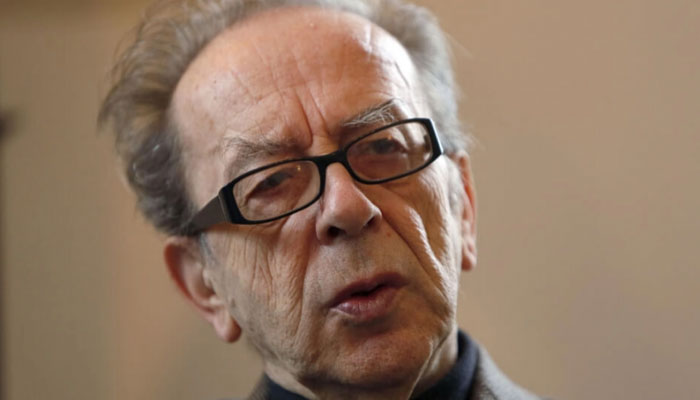Wealth of a nation
A number of Ismail Kadare's novels are considered masterpieces and are translated into around 40 languages
Think about a small country, less than one-sixth of Karachi's population. Also, it is relatively poor and has a Muslim majority. What should this country possess to somehow stand out in the world, something that would allow its citizens to hold their heads high?
Well, I am talking about Albania and its great writer of fiction, Ismail Kadare. Early this week, Ismail Kadare died in Tirana, the country’s capital. He was 88. He is being mourned across the world as Albania’s “greatest cultural monument”. One measure of his literary stature is that he was tipped for the Nobel Prize for Literature a number of times.
Before I say more about the writer and his novels, I want to explain why I have chosen to write about Kadare at a time when momentous changes are taking place in the political and social affairs of so many important countries. On Thursday, a political earthquake shook Britain, with the Labour Party winning the elections by a landslide. The second round of parliamentary elections is being held today in France, a divided country that is being assailed by the dark passions of the far right.
There was this detailed piece in The New York Times on how political unrest worldwide is fueled by high prices and huge debts. Economic turmoil is spreading across the globe and the response has been protests, attempted coups and elections of far-right politicians. In Pakistan itself, there is an entire range of issues that separately demand attention. One subject that seemed interesting was the storming of the prison in Rawalakot in Azad Kashmir because of its symbolism. Anyway, 19 hardened criminals were able to escape.
But I feel strongly about the significance that is inherent in art and culture. A creative writer is of a larger value than, say, a politician or an administrator. I may borrow Shelley’s thoughts who maintained that through their powers of imaginative understanding, the poets were able to identify and formulate emerging socio-cultural trends. Hence, they are “the unacknowledged legislators of the world”.
Sadly, not all societies appropriately honour and respect their great writers and truly creative individuals. Consequently, exceptional writers of these societies do not attract global appreciation. But when a society, howsoever small and isolated it may be, celebrates its own writers and poets, the world somehow has to take notice. This, I believe, is what happened in Ismail Kadare’s case.
I have mentioned how small Albania is, Europe’s poorest nation. It has its own language: Albanian. However, the language has a larger reach because its speakers are also in neighbouring countries. A number of migrants in Europe and North America also speak the language. Still, its speakers total from six to seven million people, about one-third of Karachi’s constantly growing population.
What is crucial here is that Ismail Kadare wrote in the Albanian language, not in English or any other major language. Very relevant in the context of what we do with our languages is the fact that Albanian is the medium of instruction in most schools of the country and the literacy rate is about 99 per cent.
So, Ismail Kadare wrote his first novel, ‘The General of the Dead Army’, in Albanian in 1963. It must have created some waves because it was translated into French. And when the French version was published in France in 1970, he suddenly shot to international fame. He was a prolific writer and continued to write novels until he died. A number of his novels are considered masterpieces and are translated into around 40 languages.
It has been recognized that Ismail Kadare brought Albania’s plight to the world. As one of his obituaries in the international media noted, he “single-handedly wrote his isolated homeland onto the map of world literature, creating often dark and allegorical works that obliquely criticized the country’s totalitarian state”. It is easy to understand why he is compared with Orwell and Kafka.
Though he did not win the Nobel prize, he remained among the world’s topmost writers of fiction and remained in headlines in the literary and cultural media. In 2005, he received the first Man Booker International Prize (now the International Booker Prize), which was then awarded for an author’s entire body of work. Incidentally, the finalists included Gabriel Garcia Marquez and Philip Roth.
I have to confess that I first learnt about him -- and the name sounded mystical -- from Mustansar Hussain Tarar many years ago. It took some time for me to get hold of one of his novels, ‘Broken April’. I borrowed it from Kashif Raza. Last year, in Los Angeles, I found three more novels from that exciting place called The Last Bookstore. It has really been a great reading experience.
Let me just give you some hints about two of his novels that particularly moved me. ‘Broken April’ is about blood feuds. A young man avenges his brother’s death and then has 30 days to hide before the other family’s surviving sons hunt him down. I found some intimations here of what we know as the Pashtun code of life.
Much more intriguing and complex is ‘The Palace of Dreams’, a fantasy set during the Ottoman Empire. An elaborate bureaucratic system is meant to collect dreams that are dreamt by the citizens in all corners of the state. These dreams are filed, sorted and analyzed. They are looking for signs of dissidence. I found this novel very strange and very gripping.
There are details of Ismail Kadare’s life that I am unable to relate. In 1990, he sought asylum in France and this event shook Albanian society and prompted political unrest and agitation. “The only act of resistance in a classic Stalinist regime is to write”, he had said when he won the Booker Prize. One of the judges praised him as “a universal writer in a tradition of storytelling that goes back to Homer”.
Let me re-assert. He was an Albanian. Wrote in the Albanian language. And conquered the literary world.
The writer is a senior journalist. He can be reached at: ghazi_salahuddin@hotmail.com
-
 Jennifer Garner Drops Parenting Truth Bomb On Teens With Kylie Kelce: 'They're Amazing'
Jennifer Garner Drops Parenting Truth Bomb On Teens With Kylie Kelce: 'They're Amazing' -
 AI Is Creating More Security Problems Than It Solves, Report Warns
AI Is Creating More Security Problems Than It Solves, Report Warns -
 'Game Of Thrones' Prequel 'A Knight Of The Seven Kingdoms' New Ratings Mark Huge Milestone
'Game Of Thrones' Prequel 'A Knight Of The Seven Kingdoms' New Ratings Mark Huge Milestone -
 Apple Seeks To Dismiss Fraud Suit Over Siri AI, Epic Injunction
Apple Seeks To Dismiss Fraud Suit Over Siri AI, Epic Injunction -
 Delroy Lindo Explains The Crucial Role Of Musical Arts In Setting Up His Career Trajectory
Delroy Lindo Explains The Crucial Role Of Musical Arts In Setting Up His Career Trajectory -
 Timothée Chalamet Reveals How He Manages To Choose The Best Roles For Himself
Timothée Chalamet Reveals How He Manages To Choose The Best Roles For Himself -
 Princesses Beatrice, Eugenie’s Conflict Gets Exposed As Mom Fergie Takes Over The Media
Princesses Beatrice, Eugenie’s Conflict Gets Exposed As Mom Fergie Takes Over The Media -
 Kate Middleton Plays Rock-paper-scissors In The Rain
Kate Middleton Plays Rock-paper-scissors In The Rain -
 Lindsay Lohan On 'confusing' Teen Fame After 'Mean Girls': 'I Should Have Listened To My Mom And Dad'
Lindsay Lohan On 'confusing' Teen Fame After 'Mean Girls': 'I Should Have Listened To My Mom And Dad' -
 Savannah Guthrie Mom Update: 'Today' Show Sees Huge Ratings Boost Amid Search For Nancy Intensifies
Savannah Guthrie Mom Update: 'Today' Show Sees Huge Ratings Boost Amid Search For Nancy Intensifies -
 Hillary Clinton To Testify In Epstein Probe Alongside Bill Clinton
Hillary Clinton To Testify In Epstein Probe Alongside Bill Clinton -
 Meghan Markle, Prince Harry End Jordan Trip With Meaningful Hospital Visit
Meghan Markle, Prince Harry End Jordan Trip With Meaningful Hospital Visit -
 AI Boyfriends Gain Popularity In China As Young Women Turn To Virtual Romance
AI Boyfriends Gain Popularity In China As Young Women Turn To Virtual Romance -
 Prince William Receives Reality Check As His Media Strategy Fails
Prince William Receives Reality Check As His Media Strategy Fails -
 Zach Braff Reflects On Doing Odd Jobs Ahead Of Major Career Breakthrough In 2001's 'Scrubs'
Zach Braff Reflects On Doing Odd Jobs Ahead Of Major Career Breakthrough In 2001's 'Scrubs' -
 Google Rolls Out Nano Banana 2 With 4K AI Image Generation
Google Rolls Out Nano Banana 2 With 4K AI Image Generation




